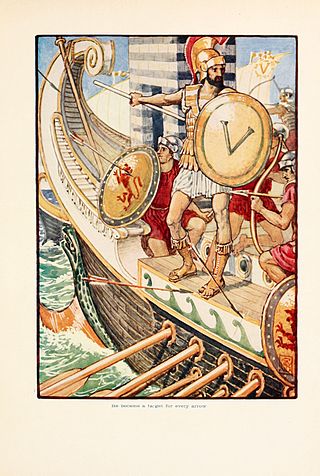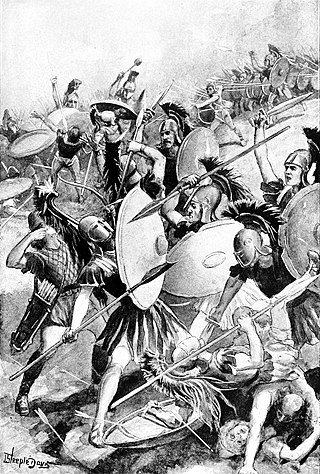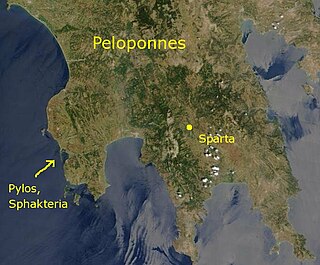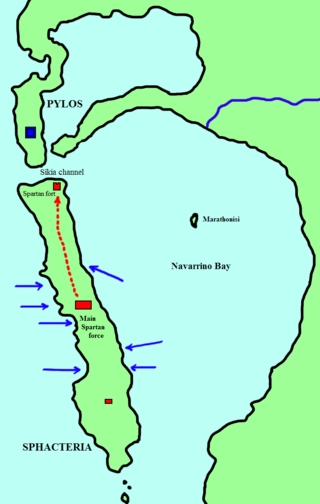Related Research Articles

The Peloponnesian War was an ancient Greek war fought between Athens and Sparta and their respective allies for the hegemony of the Greek world. The war remained undecided for a long time, until the decisive intervention of the Persian Empire in support of Sparta. Led by Lysander, the Spartan fleet, built with Persian subsidies, finally defeated Athens and started a period of Spartan hegemony over Greece.

The 5th century BC started the first day of 500 BC and ended the last day of 401 BC.
This decade witnessed the continuing decline of the Achaemenid Empire, fierce warfare amongst the Greek city-states during the Peloponnesian War, the ongoing Warring States period in Zhou dynasty China, and the closing years of the Olmec civilization in modern-day Mexico.

This is a timeline of ancient Greece from its emergence around 800 BC to its subjection to the Roman Empire in 146 BC.

Alcibiades was an Athenian statesman and general. The last of the Alcmaeonidae, he played a major role in the second half of the Peloponnesian War as a strategic advisor, military commander, and politician, but subsequently fell from prominence.
Year 424 BC was a year of the pre-Julian Roman calendar. At the time, it was known as the Year of the Tribunate of Crassus, Fidenas, Rutilus and Iullus. The denomination 424 BC for this year has been used since the early medieval period when the Anno Domini calendar era became the prevalent method in Europe for naming years.
Year 425 BC was a year of the pre-Julian Roman calendar. At the time, it was known as the Year of the Tribunate of Atratinus, Medullinus, Cincinnatus and Barbatus. The denomination 425 BC for this year has been used since the early medieval period, when the Anno Domini calendar era became the prevalent method in Europe for naming years.
Year 422 BC was a year of the pre-Julian Roman calendar. At the time, it was known as the Year of the Tribunate of Capitolinus, Mugillanus and Merenda. The denomination 422 BC for this year has been used since the early medieval period, when the Anno Domini calendar era became the prevalent method in Europe for naming years.

The Peace of Nicias was a peace treaty signed between the Greek city-states of Athens and Sparta in March 421 BC that ended the first half of the Peloponnesian War.

Nicias was an Athenian politician and general during the period of the Peloponnesian War. Nicias was a member of the Athenian aristocracy and had inherited a large fortune from his father, which was invested in the silver mines around Attica's Mt. Laurium. Following the death of Pericles in 429 BC, he became the principal rival of Cleon and the democrats in the struggle for the political leadership of the Athenian state. He was a moderate in his political views and opposed the aggressive imperialism of the democrats. His principal aim was to conclude a peace with Sparta as soon as it could be obtained on terms favourable to Athens.
Cleon was an Athenian general during the Peloponnesian War. He was an early representative of the commercial class in Athenian politics; which during the early Peloponnesian war was coming into prominence - although he was an aristocrat himself. He strongly advocated for an offensive war strategy and is remembered for being ruthless in carrying out his policies. He was often depicted in a negative way, predominantly by Thucydides and the comedic playwright Aristophanes, who both represent him as an unscrupulous, warmongering demagogue.

Brasidas was the most distinguished Spartan officer during the first decade of the Peloponnesian War. He died during the Second Battle of Amphipolis while winning one of his most spectacular victories.

The Sicilian Expedition was an Athenian military expedition to Sicily, which took place from 415–413 BC during the Peloponnesian War between Athens on one side and Sparta, Syracuse and Corinth on the other. The expedition ended in a devastating defeat for the Athenian forces, severely impacting Athens.

The History of the Peloponnesian War is a historical account of the Peloponnesian War, which was fought between the Peloponnesian League and the Delian League. It was written by Thucydides, an Athenian historian who also served as an Athenian general during the war. His account of the conflict is widely considered to be a classic and regarded as one of the earliest scholarly works of history. The History is divided into eight books.

The naval Battle of Pylos took place in 425 BC during the Peloponnesian War at the peninsula of Pylos, on the present-day Bay of Navarino in Messenia, and was an Athenian victory over Sparta. An Athenian fleet had been driven ashore at Pylos by a storm, and, at the instigation of Demosthenes, the Athenian soldiers fortified the peninsula, and a small force was left there when the fleet departed again. The establishment of an Athenian garrison in Spartan territory frightened the Spartan leadership, and the Spartan army, which had been ravaging Attica under the command of Agis, ended their expedition and marched home, while the Spartan fleet at Corcyra sailed to Pylos.

The Battle of Sphacteria was a land battle of the Peloponnesian War, fought in 425 BC between Athens and Sparta. Following the Battle of Pylos and subsequent peace negotiations, which failed, a number of Spartans were stranded on the island of Sphacteria. An Athenian force under Cleon and Demosthenes attacked and forced them to surrender.

The Battle of Amphipolis was fought in 422 BC during the Second Peloponnesian War between Athens and Sparta. It was the culmination of events that began in 424 BC with the capture of Amphipolis by the Spartans.

Demosthenes, son of Alcisthenes, was an Athenian general during the Peloponnesian War.
Laches was an Athenian aristocrat and general during the Peloponnesian War.

Classical Greece was a period of around 200 years in Ancient Greece, marked by much of the eastern Aegean and northern regions of Greek culture gaining increased autonomy from the Persian Empire; the peak flourishing of democratic Athens; the First and Second Peloponnesian Wars; the Spartan and then Theban hegemonies; and the expansion of Macedonia under Philip II. Much of the early defining politics, artistic thought, scientific thought, theatre, literature and philosophy of Western civilization derives from this period of Greek history, which had a powerful influence on the later Roman Empire. Part of the broader era of classical antiquity, the classical Greek era ended after Philip II's unification of most of the Greek world against the common enemy of the Persian Empire, which was conquered within 13 years during the wars of Alexander the Great, Philip's son.
References
- ↑ C. Michael Hogan, Cydonia, The Modern Antiquarian, Jan. 23, 2008
- ↑ Livius, Titus. The Early History of Rome. the Penguin Group. p. 331. ISBN 978-0-140-44809-2.
- ↑ Livius, Titus. The Early History of Rome. the Penguin Group. p. 337. ISBN 978-0-140-44809-2.
- ↑ Randall, Richard H. (1953). "The Erechtheum Workmen". American Journal of Archaeology. 57 (3): 199–210. doi:10.2307/500060. ISSN 0002-9114.
- ↑ May, Regine (2008). "Aristophanes in Performance 421 BC-AD 2007: 'Peace', 'Birds', and 'Frogs' by Edith Hall, Amanda Wrigley (review)". Modern Language Review. 103 (3): 807–808. doi:10.1353/mlr.2008.0126. ISSN 2222-4319.
- ↑ Magazine, Smithsonian; Shavin, Naomi. "The Ancient History of Cheating in the Olympics". Smithsonian Magazine. Retrieved 2023-08-20.
- ↑ William Spry Robinson, A Short History of Greece, 1895, Macmillan and Co., 392 pages
- ↑ Suzuki, Jeff (2009). Mathematics in Historical Context. MAA. p. 24. ISBN 9780883855706.